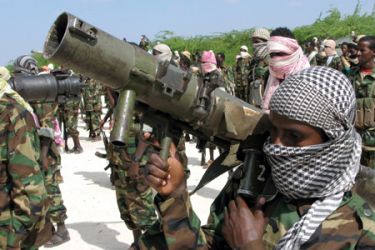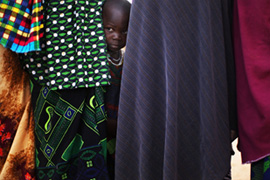Somalia ‘ripe for resolution’
International community ignored Somalia for too long and must now step up, expert says.

 |
| While some compete for power and resources, author says most Somalis are tired of war [EPA] |
In the past, probably fearing a repeat of Black Hawk Down, the international community has given little attention to addressing the root of Somalia’s problems – statelessness. It has ignored the necessity of rebuilding the Somali state, particularly its coercive capacity.
As Charles Snyder, the former US assistant secretary of state for Africa, openly said, US efforts in the country have largely focused on denying al-Qaeda the opportunity to establish military bases there and in containing Somalia’s problems to Somalia’s borders.
In retrospect, neither objective has been achieved.
The al-Shabab group has become a fully-fledged movement and is now not afraid to openly challenge both Somalis and the international community.
Moreover, long gone are the days when any given conflict affects only the people in that country. The refugee flow, free weapons and human suffering affect places that are far from Somalia.
However, attitudes are now changing. The profile of this issue has been raised and there is a sense of renewed urgency and international attention. According to the press, Somalia is activated and the UN Security Council may debate its options soon.
Reconstructing Somalia
 |
| The international community must work to enhance the will of Somalis [GALLO/GETTY] |
If the situation is to be reversed, Somalia’s state has to be reconstructed.
The long term solution to the Somalia challenge is to rebuild a strong central state.
The international community must, therefore, come up with a comprehensive strategy – and one that has a security, political and economic plan.
Moreover, the international community must keep in mind that all of its efforts have to enhance the will and the capacity of Somalis – it should not replace them.
Regarding the security component, the international community’s intervention has to focus on a suitable mandate for international peacekeeping forces that can assist the Somali government in the short term and in developing Somalia’s security forces in the long term.
One of the most challenging tasks would be to convince troop contributing countries to participate in a Somalia mission.
The Black Hawk Down event haunts many countries when considering committing to such a mission. But, things have changed in a significant way.
Although there are political stakeholders that are competing for power and resources, most Somalis are tired of the ongoing war. Moreover, the stakes are high now – as extremism and piracy pose threats to world peace – and the Somali conflict has transformed to such a significant degree that it is now “ripe for resolution” to use William Zartman’s vocabulary.
As such, events in the past should not keep the international community from doing the right thing.
Moreover, developed or semi-developed countries need to have self interest when sending their troops to Somalia.
Such leverages, while not present now, can be created.
Indonesia or Turkey might be interested in leading such a mission if Washington pressures them. As in the case of East Timor, if Somalia’s resources are on the table, powerful and energy-hungry countries, such as China, might be tempted to invest in a peacebuilding project.
Developing internal security
| IN DEPTH | |||||
|
However, commissioning peacekeeping forces alone is insufficient as they will not stay in the country forever. During the time that such forces are present, strong, inclusive and professional Somali security forces have to be recruited, trained and equipped.
In other countries where extremism and piracy have been defeated, local security forces did the job. This is doable in Somalia as the case of Burundi illustrates.
Burundi’s peace is just a few years old, yet, encouragingly, they have already sent a well-disciplined force to Somalia.
Perhaps the most important challenge in rebuilding Somalia’s forces would be to instill a nationalist identity within the soldiers and within individuals in the government.
Most would-be soldiers are young and have never known a functioning Somali government.
This is further complicated by the fact that those who would challenge these security forces are equipped with strong identities – whether that is Islam or a clan identity.
Such a challenge can be overcome as long as Somalia’s moderate Islamist movements, who have a national agenda, are part of the government, thus providing the legitimacy needed.
New governance system
Equally important is to rebuild a suitable political governance system in Somalia. The current 550-member parliament and 37-member cabinet are too large. If Rein Taagepera’s cube root rule is used, Somalia can have a 215-member parliament.
One way of fixing the current parliament is to create a bicameral system where one house represents the people and the other represents either groups (such as clans) or regions, depending on what is agreed.
Moreover, because of its simplicity and fairness, an electoral system based on national closed list proportional representation would be appropriate in this context. This model is suitable because most Somali voters are illiterate and it facilitates the unity of the country.
Another contention is whether or not Somalia should become a federal state.
Given the complications that come with a federal system and the fact that Somalia lacks the characteristics that federations have, namely the diversity of the population and the size of the country, a decentralised unitary state system would best meet local demands for choosing their leaders and accessing vital services on the one hand and meeting the need for unity – which Somalis cannot survive without – on the other.
Economic development
Economic development is also key to a sustainable peace. The long conflict and seasonal droughts have made the already weak Somali population more vulnerable.
Three major policy issues would need to be addressed to achieve this.
Firstly, Somalia’s former military regime borrowed as much as it could from bilateral and multilateral sources. Worse still, Somalia did not take advantage of the many opportunities that presented themselves over the past 20 years for debt relief. This problem will haunt Somalia’s governments in the near future and must be addressed.
Secondly, some Somali businessmen and politicians regularly print Somali banknotes, thus making the country’s currency unprotected. Any government that is serious about economic development must first win back control of the country’s bank notes from the mafia-style business groups.
Policy options include either changing the currency or adopting another country’s currency, such as the dollar or riyal. Although both of these options have implications for the economy, Zimbabwe’s recent decision to abandon its own currency and to adopt the South African Rand is an interesting and illustrative example for the Somali government.
Finally, and most importantly of all, peacebuilding and reconstruction work will cost billions of dollars. The question then becomes who should pay for this. The international community must foot the bill for now. As scholars David Laitin and James Fearon of Stanford University argued in the case of East Timor, Somalia has potential natural resources that have to be developed.
Crimes of the past
 |
| A long-running conflict and drought have made Somalis more vulnerable [GALLO/GETTY] |
Issues of justice and education will also have to be addressed. One reason why some Somalis criticise the current transitional government is that notorious warlords who are associated with war crimes are still in its ranks.
Human rights groups have called for the removal Mohamed Darwish and Abdi Qeybdid from the government for committing human rights atrocities. Although Darwish has now been removed, Qeybdid is still in the cabinet and many more questionable individuals are also playing roles in the government.
Removing such individuals is not easy as some are still armed and they can commit more crimes if they are excluded from government. Therefore, a comprehensive policy which deals with the crimes committed in the past needs to be instituted by the government itself.
Moreover, only 10 per cent of Somalia’s school age children access education. This has to change as the majority of the population is under 35 years of age.
Implementing UNESCO’s ‘education for all’ policy would help significantly. Moreover, building schools and training teachers does not have to wait until the conflict ends permanently.
Leadership
Given Somalia’s recent political history, many Somalis think that President Sharif Sheikh Ahmed and Prime Minister Omar Abdirashid do not bring negative political baggage with them as they are neither warlords nor tribal entrepreneurs.
But while both have a strong will to change Somalia’s situation, their capacity is limited.
This fact itself should be considered an opportunity.
However, the government has been notoriously slow, indecisive and focused on short-term survival – facts which can be attributed to the lack of timely assistance from the international community and the anti-institutional domestic political culture.
As such, the international community should pressure and assist the transitional government to come up with a winning plan that can stabilise the country.
Historic opportunity
The collapsed state is the root cause of Somalia’s problems and the international community has an historic opportunity to address this problem now.
Sanctioning Eritrea may further weaken the opposition groups, but it will not end the statelessness.
The international community must frame the real issue in Somalia which is the weakness of government institutions, not the strength of extremist groups.
A comprehensive state-building strategy that addresses issues of security, the economy and political development is needed immediately.
In short, Somalia, while challenging, is not as difficult as Afghanistan and Iraq. I believe that sustained international assistance to the government, which has significant local support, can reverse the situation within a short period of time.
The time has now come for the international community to stop bypassing or ignoring the already weak Somali government institutions. Reinstituting a legitimate and functioning central authority should be the priority of all interested stakeholders.
Dr Afyare Abdi Elmi teaches international politics at Qatar University’s International Affairs Department and is the author of the forthcoming book, Understanding the Conflagration of Somalia: Identity, Islam and Peacebuilding by Pluto Press.
The views expressed in this article are the author’s own and do not necessarily reflect Al Jazeera’s editorial policy.
